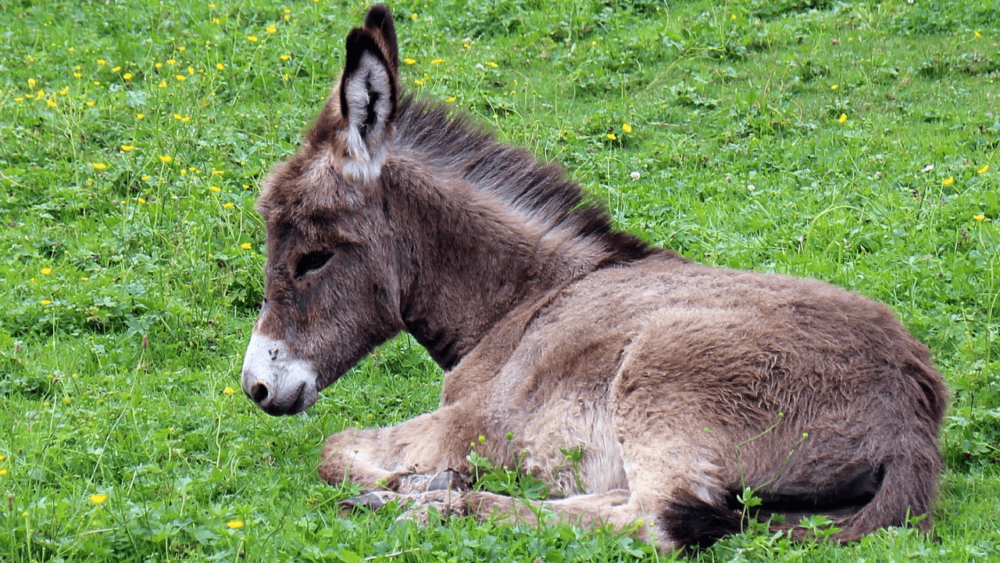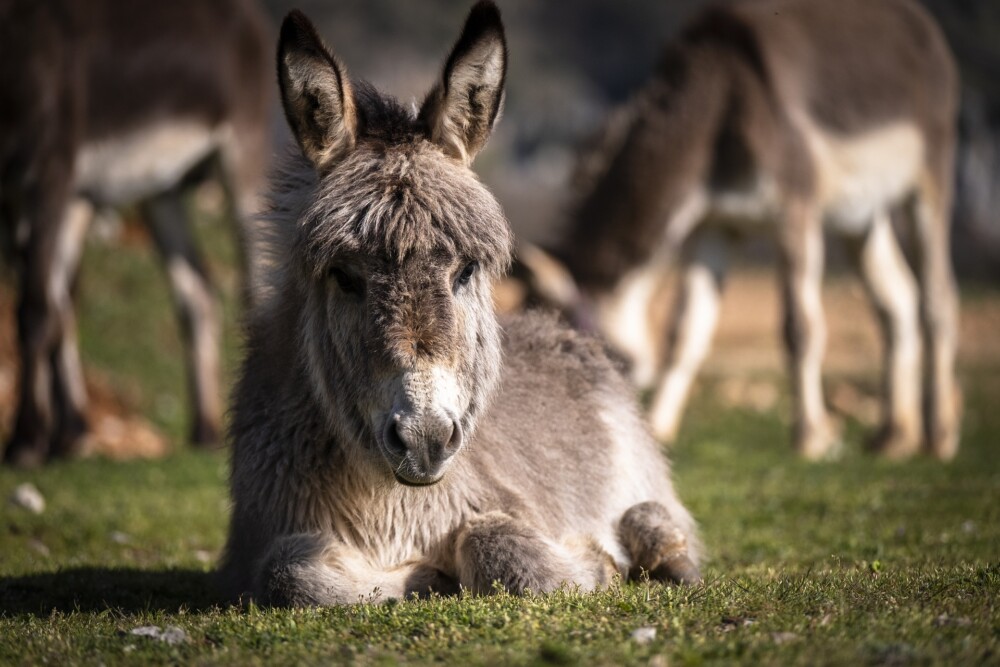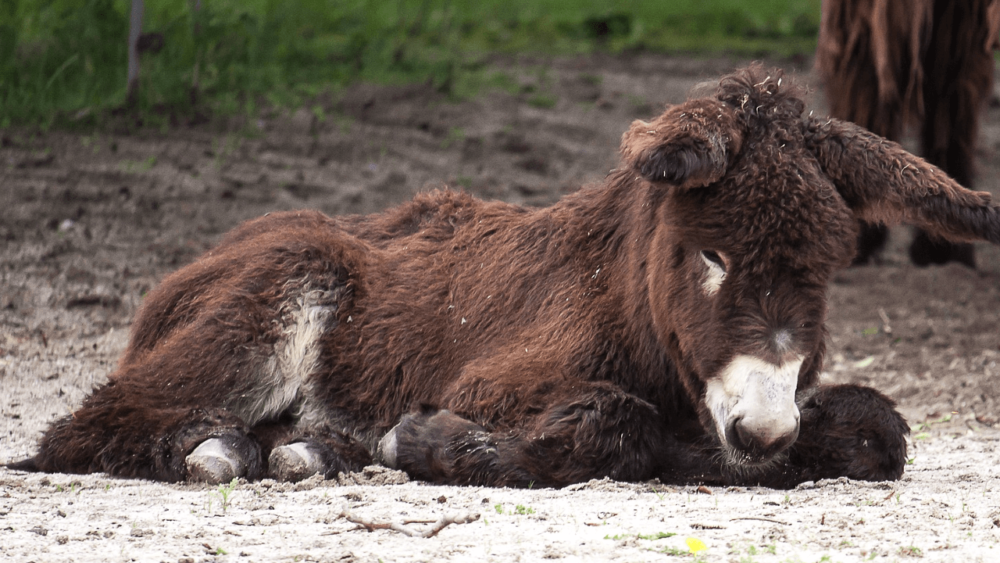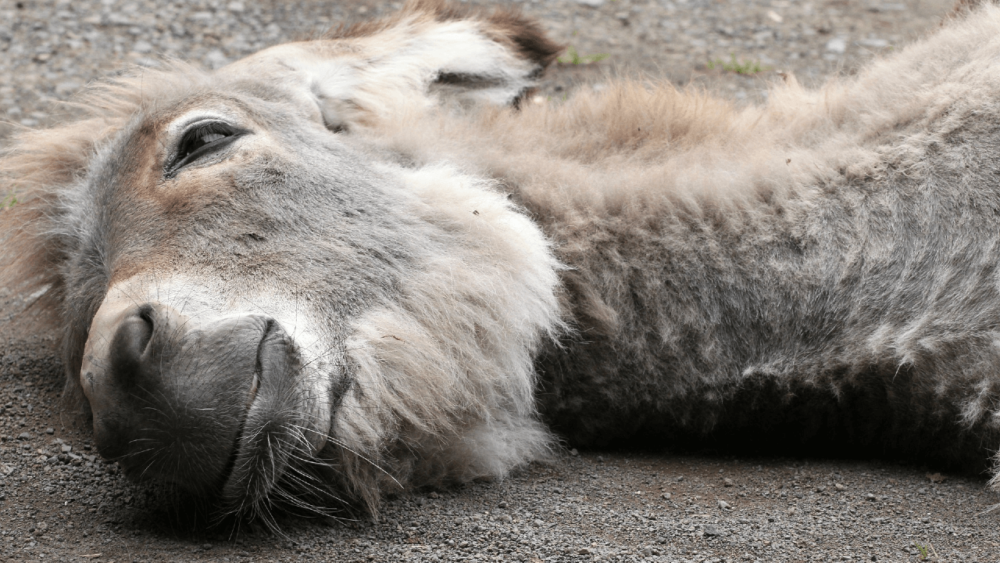When I purchased my first donkey, I believed it would simply graze without any health issues. After all, I had never really heard of a sick donkey. I had no idea what a sick donkey would look like.
But when my first donkey lay down and wouldn’t get up, I realized something was wrong.
Why won’t my donkey get up when lying down? If your donkey won’t get up, it’s because it is in pain, sick, or weak. This can happen from colic, laminitis, hyperlipidemia, insulin resistance, heatstroke, or trauma. Instinctively, a donkey will want to get up if they are able since they are prey animals so if they won’t, something is wrong!
Figuring out what is wrong with your donkey will help you assess what to do to help them. If your donkey is sick, chances are they won’t want to get up.
A donkey that can’t get up will be unable to do so due to pain or weakness. Either way, you need to call your vet and take steps to help your donkey be comfortable and keep them from injuring themselves if they roll due to pain.
Reasons for Donkeys to Lie Down
There are a host of reasons why donkeys may lie down during the course of the day or night. Some of these reasons are natural and harmless, while others are due to pain or illness. Knowing why your donkey is laying down could help you save their life.
There are often reasons why a donkey will lie down that aren’t as peaceful as being lazy or sleepy. These reasons indicate your donkey is sick, and you should always pay attention to them.
1. Lying Down From Colic Is a Cause for Concern
Donkeys may colic if their diet is not dense in roughage or if they’ve managed to get into the feed store and gorged on sweet feed when you weren’t looking. Overeating is a big cause for colic, and a donkey that has eaten too much can easily get colic.
2. Founder or Laminitis Causes Laying Down
When a donkey has eaten too much sugar-rich food such as fresh green grass or too much sweet feed, it leads to inflammation of the delicate laminae or layers inside their hoof.
The result of this is that the laminae separates from the hoof wall and sole of the hoof. Your donkey will become sensitive to walking, and they will lie down frequently to avoid putting pressure on their hooves.
3. Lying Down From Hyperlipaemia or Insulin Resistance
Donkeys and horses can develop a condition known as hyperlipemia, which is closely tied to insulin resistance. It is a condition that often plagues overweight equids.
Your donkey may have developed insulin insensitivity due to stress. As a result, the donkey will lose weight, but they will simultaneously suffer from organ failure. Organ failure is due to their body depositing lipids in the liver and kidneys.
The donkey will then lie down due to fatigue and stress. Immediate assistance by your vet is required as this condition can quickly prove fatal.
4. Heat Stroke Causes Lying Down and Immediate Danger
Donkeys have thick coats of fur, and if the weather turns warm, they may begin to suffer heat build-up. The result of this can be heatstroke or heat fatigue, which can influence their blood pressure and cause the donkey to lie down.
5. Lying Down From Severe Physical Trauma
Believe it or not, donkeys can be quite mean fighters. It is often the case that a donkey has been bullied by other donkeys, which can lead to the donkey lying down. Injuries, trauma, and serious distress can lead to a donkey not wanting to get up.
Not all lying down is dangerous for your donkey. There are four common reasons donkeys lie down. Let’s cover them.
6. Chronic Arthritis Makes it Hard to Get Up
Donkeys can suffer from arthritis as they get older. When their joints start to pain, they may struggle to get up. Lying down becomes easier than standing or getting up. This may cause your donkey to not want to get up.
7. Donkeys Lie Down More at Certain Ages
Foals are often known for lying down. This gives their legs and joints a welcome break. Also, foals tend to sleep a lot since they are growing, so it’s not unnatural to see them lying down. Early mornings will usually find my donkey foals stretched out and sunbathing as they catch an early snooze.
8. Donkeys Lie Down to Groom Their Lower Limbs
If you’re a donkey and you’re trying to groom your itchy legs, what better way to do it than by lying down. Clever donkeys will often lie down and use this opportunity to groom their legs, removing pests with their teeth and reaching under their bellies.
9. Laziness Compels Donkeys to Lie Down
Okay, so donkeys aren’t usually the most hardworking of animals when left to their own devices. A donkey will probably enjoy the opportunity to lie down in their pasture, simply enjoying the sun, fresh air, and view.
How Do You Know Your Donkey Is in Trouble?
Your donkey may present other signs than lying down that shows they are in serious trouble and may be ill or injured. Some early signs of ill health that you may spot before your donkey lies down and doesn’t want to get up include:
- Bloated Belly
- Physical injuries, cuts, scrapes, and bleeding
- Sweating
- Trembling
- Poor body posture
- Listlessness
- Restless tail twitching and or head shaking
- Standing at a strange angle with their hooves (especially if founder is involved)
My Donkey’s Down, Now What?
A quick evaluation should give you some idea of what is the matter with your donkey. Even if your donkey is lying down, be aware that a sick or injured donkey may be in pain. They may bite at you if they feel threatened.
Follow these steps to best help your donkey through this traumatic event:
Stay Calm to Keep Your Donkey Calm
If you are new to donkey or other equid drama, it is easy to become quite frazzled and upset. Donkeys and horses can feel your anxiety. Stay calm and help your donkey as best you can. Take a few deep breaths if you feel stressed, then begin to think logically and assess what to do.

Halter Your Donkey to Maintain Control
Haltering your donkey may be the last thing on your mind, but you need a reliable way to control your donkey. A halter can be used to help them up (if that’s required). With a halter, you can move your donkey as needed for your vet. It simply gives you a better way to grip and handle your donkey.
Check Donkey Vitals
When you are more experienced, you will be able to easily tell what’s wrong with your donkey, but for now, you need to collect vital information.
Take Your Donkey’s Temperature
While your donkey is lying down, take their temperature with a digital thermometer. Even a baby thermometer will do. Be sure to lubricate the thermometer tip before inserting it in your donkey’s rectum. Hold it until the thermometer beeps.
Use this opportunity to check for swelling on your donkey’s dock. A swollen dock can indicate how long your donkey has been lying down. If your donkey has been down for a long time, their tail will be extra warm or cold, and there will be swelling as blood flow is interrupted.
A healthy adult donkey’s temperature is 97.2℉-100℉. Higher temperatures indicate either a sick and feverish donkey, or it can also indicate the donkey is in distress and in pain. Lower temperatures can also indicate the donkey is experiencing a cold fever. Your donkey may be trembling if their temperature is low.
For low temperatures, use a blanket to help raise their temperatures. With high temperatures, it is best to use medical intervention and inject your donkey with anti-inflammatory medicines as opposed to cold hosing. If the fever is trauma-related, cold hosing may send your donkey into shock.
Is Your Donkey’s Respiration Normal?
Check how fast your donkey is breathing. An adult donkey should take 20 breaths per minute. Their breathing range can vary from 12 breaths (when sleeping) to 44 breaths (when exercising) per minute.
Fast breathing can indicate pain, while slow breathing can indicate weakness.
Check For a Healthy Donkey Pulse
If you can, take your donkey’s pulse on the inside of the donkey’s jaw. Find the main artery and feel the pulse there by placing two fingers on the artery. A healthy donkey’s pulse should range from 36-68 beats per minute. A faster pulse indicates distress and possibly a fever too. A slower pulse can indicate weakness and pain.
Examine Eyelid Color to Check Health
You can also tell a lot by looking at the color of your donkey’s inner eyelid. Peel back the lower eyelid, checking if the color is healthy pink, inflamed red, or jaundiced yellow.
Do the same with the donkey’s gum line. Raise their lip, press on their gum, checking how long it takes for the white pressure spot to become pink again.
The color of the donkey’s gum line can also tell you a lot. Pale gums indicate anemia and circulation problems. Pale gums are often associated with colic. Dark or blue gums indicate low blood oxygen levels. This can also be associated with colic, but it often points to ingestion of toxins or bacterial infection.
Decide if Your Donkey Should Get Up
Before you go ahead and try to pull your donkey up, decide whether they can or should get up. An injured or really sick donkey may not be able to stand. Forcing them to get up may lead to further injury.
However, if your donkey is trying to roll (which donkeys do when they are experiencing colic), be sure to stop them rolling and rather force them to get up. Rolling can lead to a twisted gut, where part of the donkey’s intestines are forced out of place with the roll. Twisted gut often leads to death and should be avoided at all cost.
If your donkey looks strong enough to get up, then gently help them up.
Technique to Get a Donkey Up
- Be sure your donkey is haltered.
- Stand next to your donkey’s shoulder, placing yourself behind their spine.
- Brace their shoulder with your knee if you fear they may roll over onto you.
- Take hold of their mane and begin to rock your donkey from side to side.
- Have a helper stand by the donkey’s head, holding the lead rein and encouraging the donkey to get up while pulling forward slightly.
- When the donkey rises, be sure to get clear so you don’t get stepped on.
When You Need to Call a Vet
Now is the moment to decide whether you (and your donkey) need a vet. If you suspect your donkey is really ill, call your vet while you walk your donkey back to their stable or barn. When in doubt, call your vet. If you are sure your donkey isn’t in immediate danger, you can decide to assess further and make the call the next day if it is necessary.
Conclusion
Your donkey may not be able to always tell you what is wrong with them. However, if you read all the signs of your donkey’s health, you will get some idea of what’s wrong with them. Follow the guidance of this article to help you assess whether your donkey is lying down for harmless or serious reasons.
Follow your gut instinct, and decide what is in your donkey’s best interest. If you’re unsure, always opt for a vet call.
My Favorite Equine Resources For Horses and Donkeys
This list contains affiliate products. Affiliate products do not cost more but helps to support BestFarmAnimals and our goal to provide farm animal owners with accurate and helpful information.
Squeaky Chicken Toy is hilarious to watch and the horses love it! It’s not super tough so keep it away from dogs.
Dewormer with Ivermectin: I use this for my horses and my goats. Duvet makes a great dewormer. I switch between the Ivermectin one and one like this one so the worms don’t get immune to it.
Manna Pro Apple Flavored Nuggets are a delicious smelling treat that my horses go crazy over.
Equinity Amino Acid Supplement for Horses makes a big difference for any horse that’s struggling with arthritis, hoof issues, or just generally. It’s great for older horses who can’t absorb all the nutrients in their food as well!
Manna Pro Weight Accelerator helps older horses gain weight and stay healthier! This was especially helpful when one of my older horses lost weight over the winter and helped her regain her weight over the summer!
Farnam Fly Control goes on the horse or donkey and will keep the flies off your sweet pet. It makes horses way more comfortable and will keep sores from getting infected as well.
Wound Kote protects sores and wounds. It acts as an antiseptic and helps wounds heal faster. It works on both my horses and goats.



